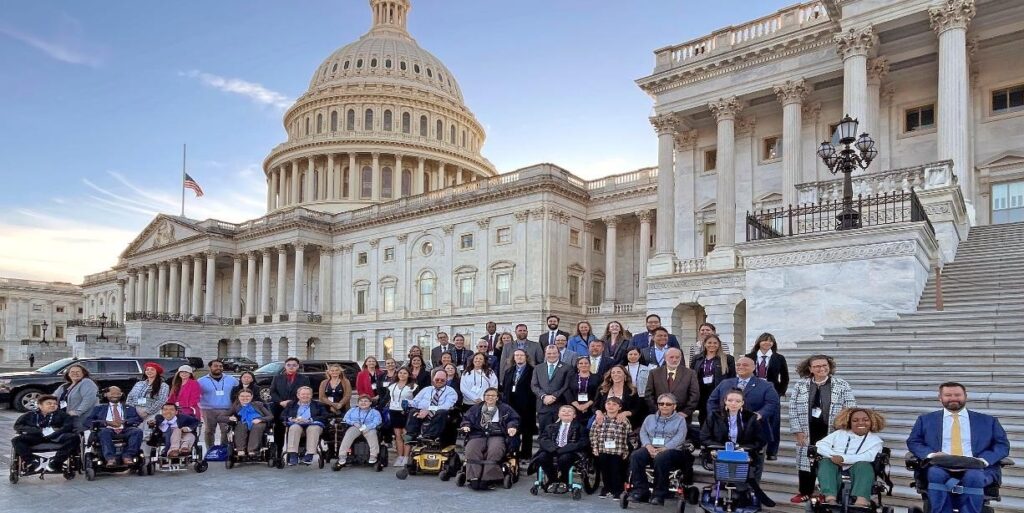
MDA Advocacy Update: Latest News on Federal Benefit Programs
By Jori Houck | Tuesday, November 21, 2023
As we approach the end of another year, the MDA Advocacy Team provides a recap of some of the most significant developments and expected changes with federal financial benefit programs this year. Read on for the most up-to-date analysis of what these changes will mean for you in terms of new developments with ABLE accounts, Supplemental Security Income (SSI), Social Security Disability Insurance (SSDI), and more.
Recent ABLE account developments:
ABLE, otherwise known as “Achieving a Better Life Experience” accounts, are tax-advantaged savings accounts that allow people living with disabilities to save up to $100,000 without impacting their eligibility for federal programs and resources.
- In 2022, Congress passed the ABLE Age Adjustment Act. This law made it so that individuals who acquired their disability diagnosis prior to age 46 were eligible to open ABLE accounts, when previously the age of diagnosis limit was 26. The change will take effect on January 1, 2026.
- Senator Bob Casey (D-PA), Chairman of the Senate Special Committee on Aging, has introduced the ABLE MATCH Act. This act aims to enhance enrollment in ABLE accounts by creating a federal dollar-for-dollar match for new and existing ABLE accounts held by individuals that make $28,000 annually or less. The match is also indexed to inflation and adjusted to factor in heads of households and married couples.
Recent developments for Supplemental Security Income (SSI):
Since 1984, SSI’s asset limits have been stuck at $2,000 for individuals, and $4,000 for couples. These limits prevent many folks living with a disability from preparing for the future, working, getting married, and providing their families with financial security. A new bill seeks to change that.
- Senators Bill Cassidy (R-LA) and Sherrod Brown (D-OH) have introduced the SSI Savings Penalty Elimination Act, a bipartisan legislation that makes changes to the existing SSI asset limits. If passed, this bill would increase asset limits to $10,000 for individuals and $20,000 for couples, while factoring in inflation with any changes to future limits. You can join MDA’s campaign to urge Congress to pass this bill to update severely outdated SSI asset limits!
Cost of Living Changes:
As the economy changes, cost of living adjustments are made to SSI and SSDI benefits to keep pace with the current costs of goods and services in the United States. In 2023 and 2024, SSDI and SSI beneficiaries will receive cost of living adjustments that aim to minimize financial disruption for beneficiaries and their families.
- SSDI beneficiaries received an 7% cost-of-living adjustment (COLA) in 2023.
- In 2024, there will be a 3.2% increase in SSI benefits, which will raise the maximum monthly SSI benefit for individuals to $943 and for couples to $1,415.
Medicaid:
Home and Community Based Services (HCBS) are a key part of ensuring compassionate, comfortable care in familiar surroundings for those living with neuromuscular disease. Recentl legislation was introduced to improve states’ HCBS programs.
- Senator Bob Casey introduced the Home and Community-Based Services (HCBS) Relief Act on October 24, 2023. The HCBS Relief Act would provide two years of increased Medicaid funding to individual states.States will use the increased funding to stabilize their HCBS service delivery networks, recruit and retain HCBS direct care workers, and meet the long-term service and support needs of people eligible for Medicaid home and community-based services.
Odds and Ends:
- Overpayments in the SSI program comprise about 8% of payments. If you or another SSI beneficiary receives an overpayment notice, you can view SSA’s guidance at this link: https://www.ssa.gov/manage-benefits/repay-overpaid-benefits.
- Social Security has several work incentives, including a trial work period allowing SSDI recipients to work for any nine months over a rolling five-year period without losing benefits. Updates to the regulations for 2024 can be found through SSA.
Next Steps and Useful Resources
- For questions about accessing federal benefit programs, please contact MDA’s advocacy team at advocacy@mdausa.org. You can join MDA advocacy and help us advocate for these and many other issues that impact the neuromuscular disease community.
- Stay up-to-date on Quest content! Subscribe to Quest Magazine and Newsletter
Disclaimer: No content on this site should ever be used as a substitute for direct medical advice from your doctor or other qualified clinician.




